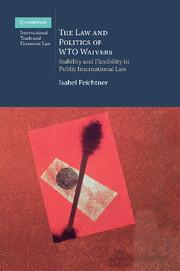Book contents
- Frontmatter
- Contents
- Acknowledgements
- 1 Why study the WTO waiver?
- Part I The stability/flexibility challenge in public international law and particularly the WTO
- 2 The stability/flexibility challenge in public international law
- 3 The WTO – public law of conflict management
- Part II The practice and law of waivers
- Part III The potential of waivers to address the stability/flexibility challenge in international law
- Bibliography
- Index
- References
2 - The stability/flexibility challenge in public international law
Published online by Cambridge University Press: 05 December 2011
- Frontmatter
- Contents
- Acknowledgements
- 1 Why study the WTO waiver?
- Part I The stability/flexibility challenge in public international law and particularly the WTO
- 2 The stability/flexibility challenge in public international law
- 3 The WTO – public law of conflict management
- Part II The practice and law of waivers
- Part III The potential of waivers to address the stability/flexibility challenge in international law
- Bibliography
- Index
- References
Summary
A. International law as public law
International law today aims not only at the delimitation of sovereign spheres of influence, the reconciliation of opposed national interests, or the reciprocal exchange of benefits between states. It increasingly seeks to promote and protect societal interests which are shared across borders – transnational interests, or, to use Wolfgang Friedmann's term, ‘common human interests’. Such international law aims at the protection of common goods, as for example the marine environment, the protection of shared values and interests, such as human rights or certainty for trans-national business transactions, and the internationalization of common spaces, such as the deep seabed or the moon.
International legal regimes that pursue such aims influence domestic government. They do so in prohibiting certain government measures or by requiring governmental action. Sometimes international institutions themselves exercise governmental functions, by adopting legislative acts, or by engaging in administration or adjudication.
- Type
- Chapter
- Information
- The Law and Politics of WTO WaiversStability and Flexibility in Public International Law, pp. 6 - 19Publisher: Cambridge University PressPrint publication year: 2011

